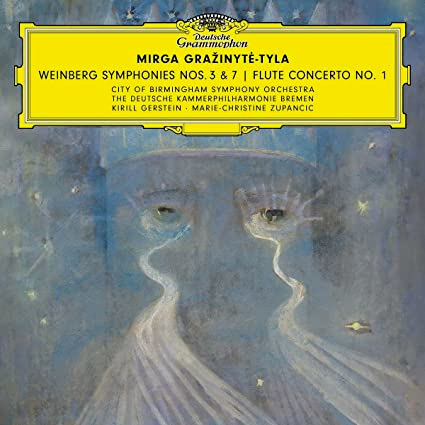

Symphony No. 7. Op. 81, for String Orchestra and Harpsichord Concerto for Flute and Orchestra No. 1, Op. 75 Symphony No. 3, Op. 45, for Large Orchestra
In June of 2019, Lithuanian conductor Mirga Grazinyte-Tyla released her debut recording at the helm of the City of Birmingham Symphony Orchestra. Oddly enough, it was a recording of the Symphonies 2 & 21 by Polish composer Mieczyslaw Weinberg (1919-1996). A strange choice by any standards for a debut recording, but then in 2020 it was awarded the prestigious "Record of the Year" award from the Gramophone Magazine. When you consider that there are thousands of new classical music recordings released each year, that is quite an accomplishment for a then unknown conductor. But it's easy to understand why. As I mentioned in the review of that recording, Mirga Grazinyte-Tyla "gets" Weinberg. There's a deeply expressive emotive underlying force at the core of all his works on which the music thrives.
The disjointed, seemingly distant and half-forgotten tune the solitary, morose harpsichord intones at the onset of the opening Adagio sostenuto movement of the Symphony No. 7. Op. 81, for String Orchestra and Harpsichord, casts a bone-chilling pall over the music. Even when the orchestral strings take over at the 1:17 mark, the unsettling mood, now even darker, remains until the solo harpsichord returns to close the first movement. The harpsichord does not play very often in this symphony, so when it does the effect is even more gripping. Most of the time it acts as an extra texture within the fabric of the strings, but when it re-appears solo and repeats the melancholy melody from the introduction, it leaves quite an impression. The whole work goes through many changes and conflicts along the way, all the more reason for the unexpected ending to leave a smile on your face. Most striking in this performance is how the string players of the Deutsche Kammerphilharmonie Bremen, even within the more turbulent moments, always generate a somewhat shrouded sound, in keeping with the music's character.
The influence of his friendship with Dmitri Shostakovich on Weinberg's music comes to the surface in the highly volatile and cheeky opening movement of the Concerto for Flute and Orchestra No. 1, Op. 75. Its touch of sardonic humour has Shostakovich writ large all over it. But then the following Largo movement (audio clip below) contains one of the most lyrical and melancholic melodies ever conceived for the flute, beautifully played here by Marie-Christine Zupancic.
When Weinberg started to write his Symphony No. 3, Op. 45, for Large Orchestra in 1949, "his name appeared in a list of works that a secret edict of Stalin's banned from being performed. Its impact on Weinberg was devastating. He wrestled with his material - indeed, it took him ten whole years to complete the work" {Booklet Notes}. By that time the political tensions had eased, so what we hear is Weinberg on his own terms. Evocative melodies, strong thematic material, highly expressive and enigmatic passages followed by bursts of energy, all presented with masterful orchestration. The autumnal tone of its expressive slow movement is very well conveyed here by the City of Birmingham Symphony Orchestra, and conductor Mirga Grazinyte-Tyla lends its final, desolate chords all the gravitas they call for. The symphony ends in a powerful gesture of defiance.
Only over the last 25 years or so has there been a resurgence of interest in the music of Mieczyslaw Weinberg, therefore the list of recordings of his momentus symphonies is still rather slim. Hopefully exceptional releases like this one will enhance this unjustly overlooked composer's image.
Jean-Yves Duperron - September 2022